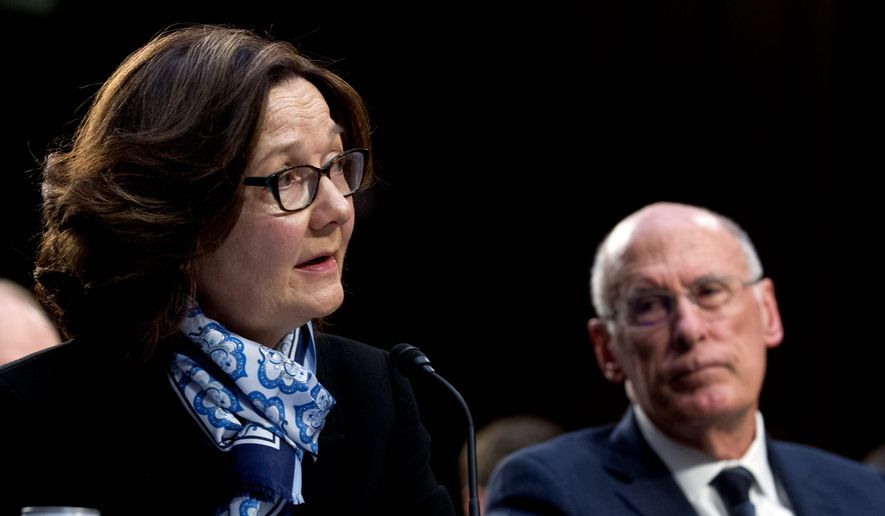The intelligence community is “very pleased” with President Trump’s decision to expel 61 Russian intelligence officers last year, assessing the evictions had “tremendous impact” on Moscow’s “ability to hurt us,” CIA Director Gina Haspel says.
Ms. Haspel’s report to the Senate Select Committee on Intelligence on Jan. 29 is one of a number of instances in which she and Director of National Intelligence Dan Coats have dovetailed with the White House on policy issues.
The annual public hearing on “Worldwide Threats” brought headlines that the nation’s chief spies are at odds with their president. They testified that Iran continues to comply with the U.S.-brokered 2015 nuclear deal and that several thousand Islamic State terrorists still remain in Syria and Iraq.
Mr. Trump dumped the Obama-negotiated Iran agreement in May. He has announced a troop pullout from eastern Syria, where U.S. forces and Arab allies all but obliterated Islamic State conquerors.
Mr. Coats said it is “unlikely” North Koreans will give up their nukes as Mr. Trump tries to persuade them to do so.
But the intelligence panel’s testimony also featured Trump-intelligence fusion, including:
• The expulsion of Russian intelligence personnel and the closing of the Russian consulate in Seattle.
“There have been very severe sanctions placed on them,” Ms. Haspel testified. “I think, as an intelligence community, both [FBI] Director [Christopher] Wray and I were very pleased with the decision to expel 61 Russian intelligence officers that has a tremendous impact on their ability to hurt us in our own homeland.”
Their removal was the administration’s quick reaction to reports that the Kremlin poisoned former Russian spy Sergei Skripal and his daughter in the English city of Salisbury.
• The CIA did not oppose the Treasury Department’s decision in December to remove sanctions on three Russian companies tied to Russian oligarch Oleg Deripaska, a close associate of Russian President Vladimir Putin.
“Did the CIA raise any concerns about the Treasury plan?” asked Sen. Susan Collins, Maine Republican.
“No, I don’t believe we raised any concerns, but we provided all the supporting intelligence about the oligarch in question versus the aluminum company that you’re referring to,” Ms. Haspel answered.
Treasury removed the sanctions after all three companies agreed to diminish Mr. Deripaska’s role in them. U.S. economic sanctions on him remain. Critics accused the president of kowtowing to Mr. Putin.
• President Trump’s outreach to North Korean leader Kim Jong-un has showed some results.
Mr. Kim is still pursing atomic weapons development despite his pledge to denuclearize the Korean Peninsula. But since outreach to Washington began, he has stopped the destabilizing act of test-firing missiles and has decided to move in a new direction.
“I think our analysts would assess that they value the dialogue with the United States, and we do see indications that Kim Jong-un is trying to navigate a path toward some kind of better future for the North Korean people,” the CIA director said.
The White House has announced that Mr. Kim and Mr. Trump will hold a second summit at the end of February.
• Mr. Coats backed the White House position that Russia is in violation of the Cold War’s Intermediate-Range Nuclear Forces Treaty. The Trump administration announced a treaty suspension last week, supported by all NATO members.
“We know Russia has violated the terms that treaty,” Mr. Coats testified.
• Ms. Haspel said that while Iran is in compliance with the nuclear deal, the Shiite-run government is discussing ways to violate restraints.
“I think the most recent information is the Iranians are considering taking steps that would lessen their adherence to [the nuclear deal] as they seek to pressure the Europeans to come through with the investment and trade benefits that Iran hoped to gain from the deal,” she said.
Mr. Coats said the deal did not produce the economic benefits Tehran expected.
The Trump administration, partly in a response to Iran’s terrorist expansion and actions in Yemen, Iraq Syria, and Lebanon, has renewed tough sanctions on Iran and urged European allies to fall in line.
Mr. Trump lashed out at the intelligence community the day after their testimony.
“The Intelligence people seem to be extremely passive and naive when it comes to the dangers of Iran,” he tweeted. “They are wrong! When I became President Iran was making trouble all over the Middle East, and beyond. Since ending the terrible Iran Nuclear Deal, they are MUCH different “
National Security Advisor John Bolton and Secretary of State Mike Pompeo have coached the president to appreciate his intelligence products and avoid such criticism.
A bit alarmed, the White House sought to calm the storm. It released an Oval Office photograph of Ms. Haspel, Mr. Coats and a senior analyst who visited to deliver the top secret Presidential Daily Brief (PDB).
Mr. Trump then tweeted: “Just concluded a great meeting with my Intel team in the Oval Office who told me that what they said on Tuesday at the Senate Hearing was mischaracterized by the media — and we are very much in agreement on Iran, ISIS, North Korea, etc. Their testimony was distorted press.”
• Rowan Scarborough can be reached at rscarborough@washingtontimes.com.




Please read our comment policy before commenting.